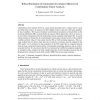Free Online Productivity Tools
i2Speak
i2Symbol
i2OCR
iTex2Img
iWeb2Print
iWeb2Shot
i2Type
iPdf2Split
iPdf2Merge
i2Bopomofo
i2Arabic
i2Style
i2Image
i2PDF
iLatex2Rtf
Sci2ools
103
click to vote
CSDA
2010
2010
Robust estimation of constrained covariance matrices for confirmatory factor analysis
Confirmatory factor analysis (CFA) is a data anylsis procedure that is widely used in social and behavioral sciences in general and other applied sciences that deal with large quantities of data (variables). The classical estimator (and inference) procedures are based either on the maximum likelihood (ML) or generalized least squares (GLS) approaches which are known to be non robust to departures from the multivariate normal asumption underlying CFA. A natural robust estimator is obtained by first estimating the (mean and) covariance matrix of the manifest variables and then "plug-in" this statistic into the ML or GLS estimating equations. This twostage method however doesn't fully take into account the covariance structure implied by the CFA model. An S -estimator for the parameters of the CFA model that is computed directly from the data is proposed instead and the corresponding estimating equations and an iterative procedure derived. It is also shown that the two est...
| Added | 09 Dec 2010 |
| Updated | 09 Dec 2010 |
| Type | Journal |
| Year | 2010 |
| Where | CSDA |
| Authors | E. Dupuis Lozeron, M. P. Victoria-Feser |
Comments (0)

